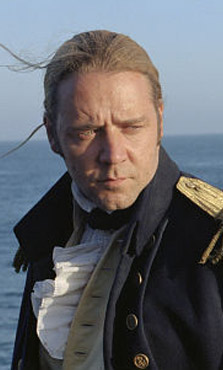 “Master and Commander” is a painstaking recreation of life on a nineteenth century British privateer called the H.M.S. Surprise. Captained by Lucky Jack, yet another of Russell Crowe’s mesmerizing studies in stoicism, the Surprise takes us on a long but absorbing trip along the coast of South America. It might well be one of the first films ever to capture fully the spirit of the literary sea voyages of Melville or Stevenson, or in this case Patrick O’Brian. “Master and Commander” is a painstaking recreation of life on a nineteenth century British privateer called the H.M.S. Surprise. Captained by Lucky Jack, yet another of Russell Crowe’s mesmerizing studies in stoicism, the Surprise takes us on a long but absorbing trip along the coast of South America. It might well be one of the first films ever to capture fully the spirit of the literary sea voyages of Melville or Stevenson, or in this case Patrick O’Brian.
Director Peter Weir has fashioned a film that brings out the beauty, terror, exhilarating discoveries and, yes, at times the tedium of long boat rides in the nether-regions of the globe. As a war film, Weir’s two-and-a-half hour chase sequence is only sporadically interesting. The fights between the French Acheron and English Surprise are fast, brutal, and often senseless. The majesty of the two ships obscures the fact that these war machines are really another form of the orderly ranks of soldiers that shot and bayonetted each other on blood-soaked battlefields at the turn of the nineteenth century. Death arrives point-blank—muskets fired in faces, swords gashing bowels—and recalls the ghastly waste of humanity in Weir’s “Gallipoli”.
The real joys of “Master and Commander” are the interstitial scenes in which Weir gives us a deck-by-deck account of the naval life of two centuries prior, from the first mate to “the last stitch”. As such, the film is a period piece as good as any ever made. The discipline of the officers, the camaraderie of the sailors, the purgatorial darkness of the holds, and the spit-and-gristle anarchy of the mess hall are rendered with clarity and simplicity.
When the Surprise reaches the Galapagos Islands, the sense of wonder in the crew and its doctor cum naturalist, Maturin, hints that this could have been a movie all its own. The charm of discovering a still largely unknown world is intact, and there’s a good deal of fun in watching this crew of mostly uneducated and uncouth sailors coming into contact with odd creatures that would later inspire Darwin’s great leap forward.
This is the one drawback to the film, in fact. Based on two of O’Brian’s novels, the lengthy narrative falls short of its epic scope because it feels chopped up, as if it could have been two movies. The contrast between the look of the film in the Atlantic (foggy, gloomy and blue-hued) and that in the Pacific (bright, clear, glassy) may serve the more basic purpose of illustrating the difference between the oceans, but it also bisects the film into two fairly distinct parts that don’t really come together. Maturin’s discovery of the Acheron seems entirely too contrived, as if Weir realized he needed to get back to his first plot as quickly as possible. Throughout the film, key members of the crew are revealed in little vignettes that don’t matter to the larger picture. However, the occasional deterioration into the episodic doesn’t dispel the overall impact of this richly researched and highly watchable film. |